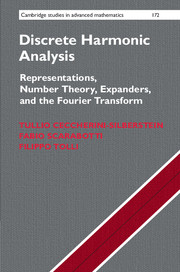Preface
Published online by Cambridge University Press: 01 June 2018
Summary
The aim of the present monograph is to introduce the reader to some central topics in discrete harmonic analysis, namely character theory of finite Abelian groups, (additive and multiplicative) character theory of finite fields, graphs and expanders, and representation theory of finite (possibly not Abelian) groups, including spherical functions, associated Fourier transforms, and spectral analysis of invariant operators. An important transversal topic, which is present in several sections of the book, is constituted by tensor products, which are developed for matrices, graphs, and representations.
We have written the book to be as self-contained as possible: it only requires some elementary notions in linear algebra (including the spectral theorem and its applications), abstract algebra (first rudiments in the theory of finite groups and rings), and elementary number theory.
First of all, we study in detail the structure of finite Abelian groups and their automorphisms.We then introduce the corresponding character theory leading to a complete analysis of the Fourier transform, focusing on the connections with number theory. For instance, we deduce Gauss lawof quadratic reciprocity from the spectral analysis of the Discrete Fourier Transform. Actually, characters of finite Abelian groups will appear also, as a fundamental tool in the proof of several deep results, in subsequent chapters, constituting this way the central topic and common thread of the whole book.
We also present Dirichlet's theorem on primes in arithmetic progressions, which is based on the character theory of finite Abelian groups as well as Tao's uncertainty principle for (finite) cyclic groups [157].
Our treatment also includes an exposition of the Fast Fourier Transform, focusing on the theoretical aspects related to its expressions in terms of factorizations and tensor products. This part of the monograph is inspired, at least partially, by the important work of Auslander and Tolimieri [15] and the papers by Davio [50] and Rose [130]. The book by Stein and Shakarchi [150] has been a fundamental source for our treatment of Dirichlet's theorem as well as for the first section of the chapter on the Fast Fourier Transform.
- Type
- Chapter
- Information
- Discrete Harmonic AnalysisRepresentations, Number Theory, Expanders, and the Fourier Transform, pp. xi - xivPublisher: Cambridge University PressPrint publication year: 2018



